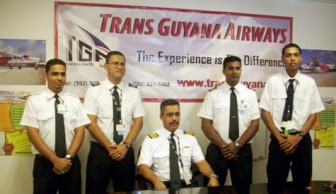Employees of Trans Guyana Airways are expected to benefit from an in-house initiative in which two eligible staff members will be trained as pilots in Miami, Florida, USA.
The company undertook a similar initiative in the early 1990s and re-started the programme last year. Each year, two persons under the employ of the company will be selected following an evaluation process and will be trained at the world renowned Flight Safety Institute in Miami. The process will continue over the next few years at a whopping cost of US$200,000 per person.
During a press briefing at the company’s offices at the Ogle Municipal Airport yesterday, Chief Financial Officer, Nicole Correia, told the media in the presence of company officials and four trainee pilots who are benefiting from the programme, that the initiative is also open to the relatives of its employees once they meet the minimum requirements.

She said the company decided to implement the continuous training programme of recruiting directly from its employee base in the long term, citing a shortage of pilots and lack of adequate flight training in Guyana.
She said that in the past the company looked at hiring pilots from overseas and other persons who came back to Guyana with different levels of qualifications and skills. She noted however, that because of the unique flying environment here, it takes “quite a long time to bring the pilots up to the standard that we have to undergo here”.
She said the philosophy within the company relates to its internal environment and its staff and the longevity of having persons remain working for the company until retirement. On this note, she said there are various self development plans and benefits which the company offers to its staff.
TGA staff are looking for further growth and development, she said, adding that the trainees who are selected may have never envisaged themselves becoming pilots.
“We are looking for that sort of win-win condition for them: they are happy that they are working within the company environment and we are able to provide for training.”
Correia said the programme is open to any staff member of the company or family member who is between the ages of 18 to 34 and possesses minimum CXC standards, adding that the applications along with supporting information are scrutinised by TGA officials. A member of the Flight Safety Institute then visits the company and interviews the persons selected, to determine whether s/he is committed to being in the field.
She said the top 5 persons are then selected and following a flight evaluation, the top two persons are selected to travel to Miami for the training.
She said the intensive one-year training allows the trainee to return here fully equipped to utilize his/her skills. It can take up to 3 years before the pilots are able to fly to all the destinations across the country.
Correia said the exercise is costly, noting that the trainee would sign 5-year contracts and are required to pay 35% of the overall cost of the programme, the entire process from training to being a full command pilot is completed.
Chief Pilot Andre Farinha, who was one of the company’s airmen and who joined TGA as an accountant before benefiting from a one-off initiative in the early 1990s, noted that programme is unique to the industry.
He said TGA saw the merits of the programme when it was first introduced in the 1990s, and according to him, the pilots will benefit from the best possible training while in Miami. He said TGA believes “the best equipment you can put in an aircraft is a well-trained pilot”.
Upon completion of the overseas training stint, the pilot would have attained 250 hours of flight time with a full rating. The trainees would be required to familiarize themselves himself with the geographical terrain here.
So far two employees, engineers Cleon Melville who has been working with TGA since 1995 and Paul Ramdat, who joined TGA within the past decade, have completed their training overseas. Melville and Ramdat stated yesterday that they came from humble beginnings and never dreamt of becoming pilots, citing the cost attached to the training.
Young Jonathan Mohammed, called the baby of the scheme, will be travelling overseas along with Management Information Systems (MIS) technician Peter Dos Ramos for their training next month.
Dos Ramos considers himself “lucky” as regards his selection, having only joined TGA in July 2011 while Mohammed noted that, like his colleagues, he wanted to be a pilot from childhood. He said if he could not become a pilot, at least he would become an engineer, a feat which he completed at the Art Williams and Harry Wendt Aeronautical Engineering School at Ogle. The Marian Academy graduate expressed gratitude for being afforded the opportunity.
TGA operates 8 aircraft which fly 22 domestic flights per day servicing the hinterland. Two flights are also operated to neighbouring Suriname daily. The company stated that the initiative is an attempt to cushion the increased demand for pilots and rapid development of the local aviation industry.





